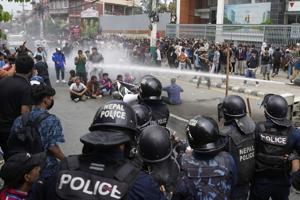Protests erupted in Kathmandu, Nepal, on March 6, 2023, when police opened fire on demonstrators opposing a government ban on social media platforms, resulting in the deaths of at least 11 individuals and injuring many more. The violence unfolded as tens of thousands gathered to express their outrage over the government’s decision to block access to major platforms including Facebook, X, and YouTube.
According to Dr. Badri Risal at the National Trauma Center, seven fatalities were reported at the facility, with 58 individuals receiving treatment for injuries, many of which were serious. “Many of them are in serious condition and appear to have been shot in the head and chest,” Dr. Risal commented. Families anxiously waited outside hospitals for news of their loved ones, while others lined up to donate blood as the situation grew increasingly dire.
Two additional victims died at the Civil Hospital and KMC Hospital, as confirmed by medical professionals who requested anonymity. The wounded were spread across various hospitals in Kathmandu, highlighting the severity of the clashes.
Protesters converged on Nepal’s Parliament building, pushing through barricades and confronting riot police, who were ultimately forced to retreat. Amid the chaos, police deployed tear gas and water cannons in an attempt to disperse the crowd but were quickly overwhelmed. As tensions escalated, law enforcement opened fire on the demonstrators, prompting the government to impose a curfew around key locations in the city, including Parliament and the presidential residence.
The protest, dubbed the “Gen Z Rally,” specifically targeted the government’s recent actions to block social media platforms that had not registered with local authorities. The government stated that approximately two dozen popular platforms received warnings to comply with registration requirements, which led to their blocking last week. Some platforms, such as TikTok and Viber, complied and continued to operate without interruption.
The government’s move to restrict social media access coincided with a proposed bill in Parliament aimed at ensuring that social media platforms are “properly managed, responsible, and accountable.” This legislation includes provisions requiring companies to appoint a local liaison office. Critics have condemned the bill as a means of censorship, arguing it threatens freedom of expression and undermines fundamental rights in Nepal.
Rights organizations have voiced strong opposition to the government’s increasing control over digital platforms, claiming it is an attempt to silence dissenting voices. In 2023, the government had previously banned TikTok, citing concerns over “disrupting social harmony,” but lifted the ban after TikTok executives agreed to comply with local regulations, including restrictions on pornographic content.
As the situation in Kathmandu remains tense, the impact of this violent confrontation is likely to resonate throughout Nepal, bringing further scrutiny to the government’s policies regarding social media and free speech.





































































